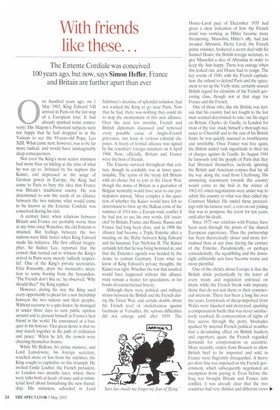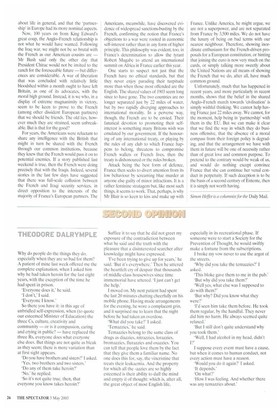With friends like these. . .
The Entente Cordiale was conceived
100 years ago, but now, says Simon Heifer, France and Britain are further apart than ever 0 ne hundred years ago, on I May 1903, King Edward VII arrived in Paris on the last stop of a European tour. It had already sparked some controversy: His Majesty's Protestant subjects were not happy that he had dropped in at the Vatican to see the 93-year-old Pope. Leo XIII. What came next, however, was to be far more radical, and would have unimaginably deep consequences.
Not even the King's most senior ministers had more than an inkling at the time of what he was up to. Irritated by his nephew the Kaiser, and depressed at the surge of German power in Europe, the King had come to Paris to bury the idea that France was Britain's traditional enemy. He was determined to sow the seeds of an alliance between the two nations; what would come to be known as the Entente Cordiale was conceived during his visit.
A century later, when relations between Britain and France are probably worse than at any time since Waterloo, the old Entente is strained. But feelings between the two nations were little better when King Edward made his initiative. His first official biographer, Sir Sidney Lee, reported that the crowds that turned out to witness the King's arrival in Paris were merely 'sullenly respectful'. One of the King's private secretaries. Fritz Ponsonby, drew the monarch's attention to some booing from the bystanders. The French don't like us.' he observed. 'Why should they?' the King replied.
However, during his stay the King used every opportunity to plead for a new friendship between the two nations and their peoples. Without recourse to a spin doctor, he managed in under three days to turn public opinion around and to present himself as France's best friend in the world. He announced at a banquet in his honour, 'Our great desire is that we may march together in the path of civilisation and peace.' When he left, the crowds were cheering themselves hoarse.
While Mr Balfour, his prime minister, and Lord Lansdowne, his foreign secretary, watched more or less from the sidelines, the King sought to capitalise on this triumph. He invited Emile Loubet, the French president. to London two months later, where there were talks both at headof-state and at ministerial level about formalising the new friendship. His ministers, schooled in Lord Salisbury's doctrine of splendid isolation, had not wanted the King to go near Paris. Now that he had, there was nothing they could do to stop the momentum of this new alliance. Over the next few months. French and British diplomats discussed and removed every possible cause of Anglo—French grievance, not least in various colonial disputes. A treaty of formal alliance was signed by the countries' foreign ministers on 8 April 1904. Now, officially, Britain and France were the best of friends.
The Entente survived throughout that century, though its cordiality was at times questionable. The terms of the treaty left Britain with no choice but to join in the Great War, though the status of Britain as a guarantor of Belgian neutrality would have seen to our participation anyway. More complex is the question of whether the Kaiser would have felt so determined to blow up the Balkan crisis of the summer of 1914 into a Europe-wide conflict if he had not, to use his own words, felt 'encircled' by Britain. France and Russia. Russia and France had long been close, and in 1908 the alliance had become a Triple Entente after a meeting on the Baltic between King Edward and his kinsman Tsar Nicholas II. The Kaiser certainly felt that he was being hemmed in, and that the Entente's agenda was headed by the desire to contain Germany. From what we know of King Edward's private thoughts, the Kaiser was right. Whether the war that resulted would have happened without this alliance must remain a matter for speculation, or for books of counterfactual history.
Although there were political and military strains between the British and the French during the Great War, and certain doubts about the French level of vindictiveness against Germany at Versailles, the serious difficulties did not emerge until after 1939. The Hoare—Laval pact of December 1935 had given a clear indication of how the French mind was working as Hitler became more threatening. Mussolini, Hitler's ally, had just invaded Abyssinia. Pierre Laval. the French prime minister, brokered a secret deal with Sir Samuel Hoare. the British foreign secretary, to give Mussolini a slice of Abyssinia in order to keep the Axis happy. There was outrage when this leaked out, and Hoare had to resign. The key events of 1940, with the French capitulation, the refusal to defend Paris and the agreement to set up the Vichy state, certainly soured British regard for elements of the French governing class, though not at that stage for France and the French.
One of those who, like the British, was furious that his country had not fought to the last man seemed determined to take out his anger on Britain. Charles de Gaulle, in London for most of the war, made himself a thorough nuisance to Churchill and to the rest of his British hosts; he was quickly assessed as troublesome and unreliable. Once France was free again, the British added rank ingratitude to their list of charges against de Gaulle. In August 1944 he famously told the people of Paris that they had liberated themselves, tactlessly ignoring the British and American corpses that lay all the way along the road from Cherbourg. His simmering resentment towards this country would come to the boil in the winter of 1962-63, when negotiations were under way to admit this country to what was then called the Common Market. He ended those proceedings with his famous 'non', a veto on our joining that was to postpone the event for ten years, until after his death.
Since 1973 our relations with France have been seen through the prism of the shared European experience. Thus the partnership has been theoretically closer and more formalised than at any time during the century of the Entente. Paradoxically, or perhaps coincidentally, the squabbling and the downright unfriendly acts have become worse and more plentiful.
One of the clichés about Europe is that the British abide pedantically by the letter of every treaty and regulation enforced on them, while the French break with impunity those that do not suit them or their commercial interests. There has been a long list over the years. Lonyloads of sheep imported from Wales were hijacked and destroyed, sparking a compensation battle that was never satisfactorily resolved. In contravention of rights of free access through the ports, blockades sparked by internal French political troubles had a devastating effect on British hauliers and exporters; again. the French regarded demands for compensation as eccentric. More recently, orders from Brussels to allow British beef to be imported and sold in France were flagrantly disregarded. A heavy per diem fine was imposed on the French government, which subsequently negotiated an exemption from paying it. Even before the Iraq war brought Britain and France into conflict, it was already clear that the two countries had very distinct and different views about life in general, and that the 'partnership in Europe had its more nominal aspects.
Now. 100 years on from King Edward's great coup, the Anglo–French relationship is not what he would have wanted. Following the Iraq war, we might not be so brutal with the French as our American cousins are — Mr Bush said only the other day that President Chirac would not be invited to the ranch for the foreseeable future — but differences are considerable. A war of liberation that was concluded with relatively little bloodshed within a month ought to have left Britain, as one of its advocates, with the moral high ground. Instead, it is we who, in a display of extreme magnanimity in victory, seem to be keen to prove to the French (among other dissident European partners) that we should be friends. The old ties, however much they are strained, seem unbreakable. But is that for the good?
For years, the Americans were reluctant to share any intelligence with the British that might in turn be shared with the French through our common institutions, because they knew that the French would pass it on to potential enemies. If a story published last weekend is true, then the French were doing precisely that with the Iraqis. Indeed, several stories in the last few days have suggested that there was full-scale collusion between the French and Iraqi security services, in direct opposition to the interests of the majority of France's European partners. The Americans, meanwhile, have discovered evidence of widespread sanctions-busting by the French, confirming the notion that France's objections to a war were rooted in economic self-interest rather than in any form of higher principle. This philosophy was evident, too, in France's determination to allow the tyrant Robert Mugabe to attend an international summit on Africa in France earlier this year.
One starts to suspect not just that the French have no ethical standards, but that they never enjoy parading their turpitude more than when those most offended are the English. The shared values of 1903 seem long since to have gone. The two countries are no longer separated just by 22 miles of water, but by two rapidly diverging approaches to international morality. In a perverse way, though, the French are to be envied. Their fanatical devotion to promoting their selfinterest is something many Britons wish was emulated by our government. If the honouring of any international treaty, or playing by the rules of any club to which France happens to belong, threatens to compromise French wallets or French lives, then the treaty is dishonoured or the rules broken.
Attack being the best form of defence, France then seeks to divert attention from its low behaviour by screaming blue murder at anyone else guilty of minor infractions. It is a rather feminine stratagem but, like most such things, it seems to work. That, perhaps, is why Mr Blair is so keen to kiss and make up with France. Unlike America, he might argue, we are not a superpower, and are not separated from France by 3,500 miles. We do not have the luxury of being on bad terms with our nearest neighbour. Therefore, showing inordinate enthusiasm for the French-driven proposals for a European constitution, or hinting that joining the euro is now very much on the cards, or simply talking more sweetly about the United Nations are all means of showing the French that we do, after all, have much common ground.
Unfortunately, much that has happened in recent years, and more particularly in recent months, shows that the belief in the shared Anglo–French march towards 'civilisation' is simply wishful thinking. We cannot help having France just 22 miles away. We cannot, for the moment, help being in 'partnership' with them in the EU. But we can make it clear that we find the way in which they do business offensive, that the absence of a moral compass from their foreign policy is degrading, and that the arrangement we have with them in future will be one of necessity rather than of great love and common purpose. To pretend to the contrary would be weak of us, and would do nothing except convince France that she can continue her venal conduct in perpetuity. If such deception is to be the basis of a second century of Entente, then it is simply not worth having, Simon Heifer is a columnist for the Daily Mail.











































































 Previous page
Previous page